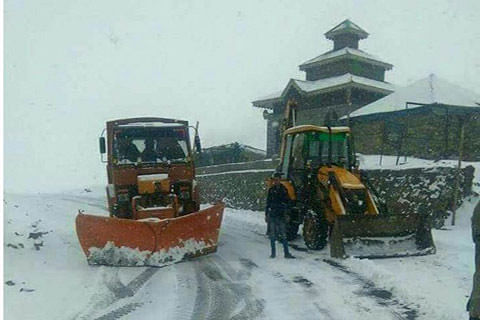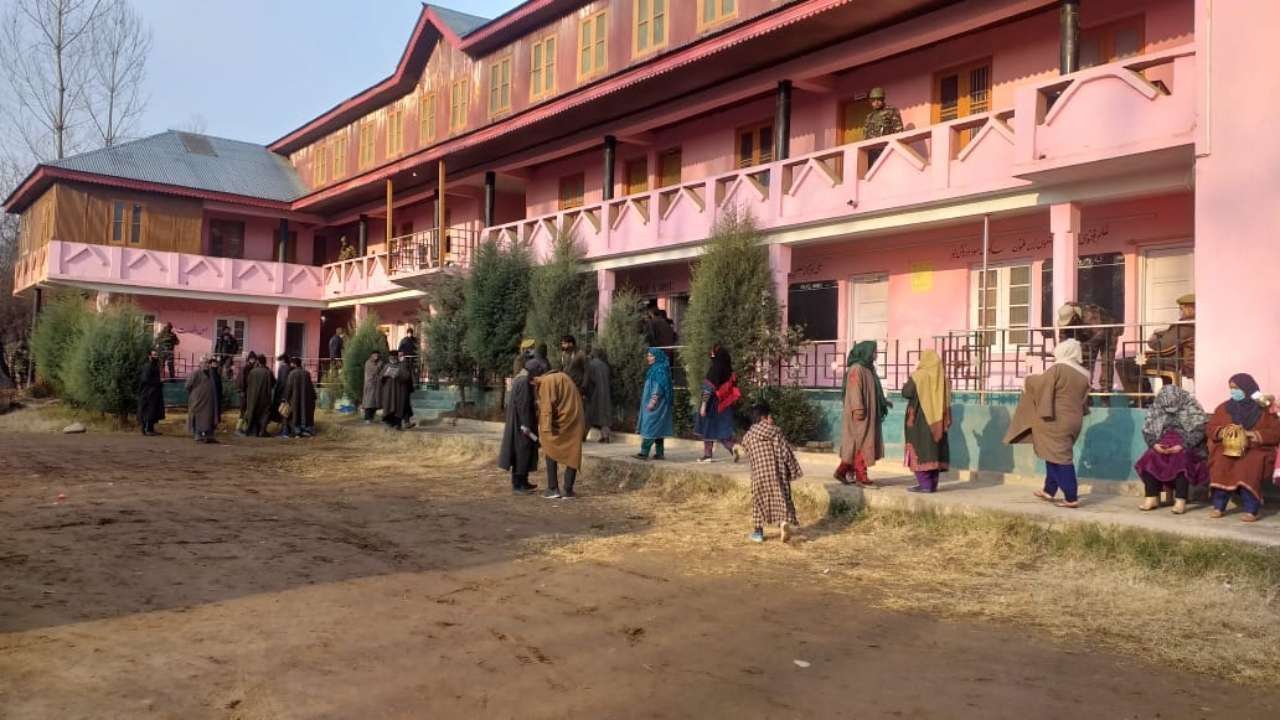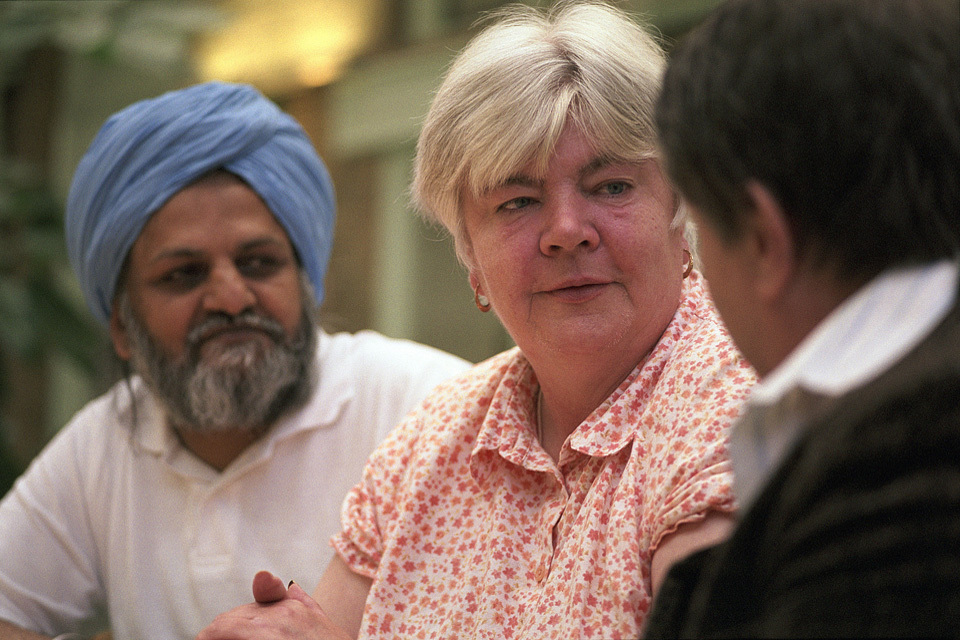- Select a language for the TTS:
- UK English Female
- UK English Male
- US English Female
- US English Male
- Australian Female
- Australian Male
- Language selected: (auto detect) - EN
Play all audios:
ABSTRACT This editorial aims to clarify the role of community-led initiatives such as ecovillages in the global efforts to mitigate climate change. The response to the climate crises
prefigured by these initiatives is based on relocalisation, cultural diversity and social empowerment. In this paper, we describe their commonalities, limitations and their potentials
towards a decarbonisation of everyday life and the emergence of a decentralised and empowered civil society. We see community-led initiatives as laboratories and transformative learning
fields on sustainable practices, interpersonal competencies, personal development, and the creation of plural ways of living, relating and knowing. We underline the need for greater
recognition of community-led initiatives by scientific, economic and political actors in the framework of a concerted climate governance from the top-down and from the bottom-up. EDITORIAL
That we need great and urgent changes at the global level in order to keep our planet liveable is, today, a rather uncontroversial fact. Everything becomes more controversial and political
when we begin to discuss _how_ to address the great challenges of our time, e.g. how to achieve and maintain a safe global average temperature. At one extreme is geoengineering and other
technological fixes. It is attractive because it would require little changes in the _status quo_, but it is also fundamentally undemocratic and exclusionary (Sovacool 2021) and poses
enormous known and unknown risks (Bodansky 2013). At the other extreme is the decarbonisation of daily life of people all over the planet. This alternative would require that people in
different cultures and socio-ecological systems create their own sustainable solutions adapted to each context. There is no precedent for this type of change and no single entity can control
it, but ecovillages and other community-led initiatives might be our best examples of efforts in this direction (Daly 2017; Schäfer et al. 2018; Sherry 2019). Community-led initiatives
(CLIs) are learning and experimental laboratories of how people can collaborate and live more sustainably (Roysen and Mertens 2019; Seyfang and Smith 2007). They include not only
ecovillages, but also sharing schemes, community energy (Korjonen-Kuusipuro et al. 2017; Seyfang et al. 2013), Transition Towns (Feola and Butt, 2017; Seyfang et al. 2010), degrowth coops,
community currencies (Seyfang and Longhurst 2013), co-housing projects (Mulder et al. 2006), and traditional communities from the Global South working with sustainability (Acosta 2016,
Escobar 2010, Ungarelli 2009). What is common among all these initiatives is that they emerge from the bottom-up, are based on values of conviviality and commons (Helfrich 2015), and they
prefigure “their vision of a future society through their ongoing social practices, social relations, decision-making philosophy and culture” (Monticelli 2018, p. 509). CLIs in general, and
ecovillages in particular, experiment with alternative practices in construction, energy/water use, agroforestry etc. in their own locally adapted way, combining scientific and traditional
knowledge, broadening the range of solutions available to specific socio-ecological contexts. The world is facing a narrowing window of opportunity for effective climate action (Pörtner et
al., 2022). While research has placed an emphasis on macro-level policies as well as economic and technological solutions, community-led initiatives have been addressed to a lesser extent
and overlooked by leaders responsible for developing effective solutions to the climate crisis. However, there is a lot to learn from community-led experiments around the world, especially
ecovillages. Since ecovillages are institutions in which public and private life fall together in one local space, the difficulties of social collaboration become more visible than in other
institutional settings. In this sense, ecovillages are unique not only in their integration of sustainable and regenerative practices in different dimensions of life, but also in their
particular focus on interpersonal competencies and personal development (Boyer 2016; Esteves 2020). Many problems we presently witness in the world are not caused by the lack of
technologies, but by people’s lack of capacity to live and work together, to take on their share of responsibility, to collaborate, to share resources and to co-create solutions with people
from different cultural backgrounds. Although ecovillages are not perfect, they are experimenting and developing solutions in all these dimensions, and are thus incubators of innovations and
learnings. Often ecovillages start with a CLI and generate smaller CLIs that go with their efforts beyond and above the ecovillage itself (Schwab 2020). Many CLIs are also questioning
dominant models of social life and proposing new and plural ways of living, relating and knowing. In the Global South, ecovillages and CLIs are building models of social life based on the
_Buen Vivir_ (the collective “good living” of indigenous cosmovisions), on communities’ rights to their territories and on alternatives to development (Chaves et al. 2017, 2018; Escobar
2018). In the Global North, the notion of degrowth is articulating visions of radical societal transformation, with different kinds of institutions for the “relocalisation and reinvention of
democracy” (Escobar 2018, p. 146). What brings these varied initiatives together is the promotion of relocalisation, local autonomy and proposals for profound transformations, not only in
politics and economics, but also in breaking ontological divisions between nature and culture, and between individual and community. These initiatives thus point to the possibility of a
pluriverse: a world where many worlds fit (Chaves et al., 2017; Escobar 2015, 2018). CLIs are also important for addressing climate change because: (1) They use contextualised knowledge and
practical experience, being better able to meet local demands than top-down approaches (Ergas 2010; Seyfang and Smith 2007). (2) Because they are locally appropriate, they result in more
relevant and effective actions and more enduring outcomes (Pörtner et al. 2022; Wieczorek 2018). Finally, (3) because they are bottom-up they tend to be more inclusive, empowering and
nurturing of alternative pathways to development (Feola, 2020; Höffken et al. 2021; Smith et al. 2014). They are, therefore, potentially powerful actors for a coordinated global action
towards a decentralised and empowered civil society. CLIs such as ecovillages can be regarded as incubators for other ways of being in a rapidly changing world. They make efforts to embed
regeneration in daily social and cultural practices, and to create new models of well-being that are not so much attached to economic growth and consumerism (Roysen and Mertens 2019). In
general, it can be said that they have lessons to share on how to be resilient in times of climate change and how to mitigate climate change on a local scale (Sherry 2019). Furthermore,
these initiatives are creating knowledge on how to make decisions regarding common resources in a more horizontal way, and on how to build communities based on plural and diverse values and
worldviews (Chaves et al. 2018; Wittmayer et al. 2019). Examples of education for sustainability can also be observed (Allen-Gil et al. 2005; Papenfuss and Merritt 2019; Roysen and Cruz
2020). CLIs tend to be not only local but translocal (Avelino et al. 2020; Loorbach et al. 2020), in the sense that while being locally active, they are also connected to a global network of
other locally-rooted initiatives. These translocal networks help them “build advocacy coalitions beyond the local”, allowing them to engage with national and transnational actors, to lobby
(trans-) national governments and to build alliances with other societal actors (Loorbach et al. 2020, p. 257). How these translocal networks of CLIs contribute to challenging frames and
embedding sustainable practices in broader society remains under-theorised. Ecovillages and other forms of CLIs face many challenges, such as problems with funding, and lack of access to
certain skills and appropriate sustainable technologies. Due to their small scale and alternative norms and values, they may also have more difficulties translating their ideas to broader
society (Seyfang and Smith 2007). However, many studies conducted in the past ten years have shown that ecovillages and other CLIs do influence society in many different ways, including
through participation in local politics and partnerships with governments and other local groups (Bochinski 2015; Boyer 2015; Dias et al. 2017; Feola and Butt 2017; Ornetzeder and Rohracher
2013; Roysen and Mertens 2017; Roysen and Schwab 2021; Schwab 2020; Stüwe 2009). It is important, therefore, that these initiatives find ways to increase their interaction with other levels
of climate action (regional, national and global) through partnerships and inclusive governance. Although it is common to dismiss these initiatives for being too marginal and for failing to
attend to deeper structural problems (Smith et al. 2014), our view is that they need more recognition and inclusion in governance for climate action, in the local, regional, national and
global levels. In this urgent move towards concerted climate action, we need diverse, inclusive and collaborative action—from the top-down _and_ from the bottom-up (Leach et al. 2012). The
goal of this special collection is to give more visibility to CLIs and to enhance our understanding of how their potentials can be strengthened and their limitations can be addressed. We
want to catalyse the debate about the social, ecological, political, economic and cultural aspects of community-led climate action. Why do the behaviours and lifestyles of some CLIs diffuse
beyond a community’s boundaries while others do not? Why are educational initiatives developed by ecovillages more transformational then conventional ones, and how can these models be
adapted and spread? How can municipalities collaborate with community-led initiatives to catalyse local transformations? Why, in many circumstances, does community-led entrepreneurship
struggle to address the economic pillar of sustainability while succeeding in others? How can national policies support community-led climate action and the other way around? How can
ecovillages become more diverse and inclusive? These are just a few of the many questions that must be answered if we want to foster climate actions that are culturally diverse, socially
appropriated, locally rooted and community empowered. REFERENCES * Acosta A (2016) O Bem Viver: uma oportunidade para imaginar outros mundos (T. Breda (trans.)). Autonomia Literária /
Editora Elefante. * Allen-Gil S, Walker L, Thomas G, Shevory T, Elan S (2005) Forming a community partnership to enhance education in sustainability. Int J Sustain High Educ 6(4):392–402.
https://doi.org/10.1108/14676370510623874 Article Google Scholar * Avelino F, Dumitru A, Cipolla C, Kunze I, Wittmayer J (2020) Translocal empowerment in transformative social innovation
networks. Eur Plan Stud 28(5):955–977. https://doi.org/10.1080/09654313.2019.1578339 Article Google Scholar * Bochinski LB (2015) Alumni of experimental communities: agents of change at a
critical time Google Scholar * Bodansky D (2013) The who, what, and wherefore of geoengineering governance. Clim Chang 121(3):539–551. https://doi.org/10.1007/s10584-013-0759-7 Article
Google Scholar * Boyer R (2015) Grassroots innovation for urban sustainability: comparing the diffusion pathways of three ecovillage projects. Environ Plan A 47(2):320–337.
https://doi.org/10.1068/a140250p Article Google Scholar * Boyer R (2016) Achieving one-planet living through transitions in social practice: a case study of Dancing Rabbit Ecovillage.
Sustainability Sci Pract Policy 12(1):1–6 Google Scholar * Wieczorek AJ (2018) Sustainability transitions in developing countries: Major insights and their implications for research and
policy. Environ Sci Policy 84(September 2017):204–216. https://doi.org/10.1016/j.envsci.2017.08.008 Article Google Scholar * Wittmayer J, Backhaus J, Avelino F, Pel B, Strasser T, Kunze I,
Zuijderwijk L (2019) Narratives of change: how social innovation initiatives construct societal transformation. Futures 112(102433):1–12. https://doi.org/10.1016/j.futures.2019.06.005 S1 -
12 M4 - Citavi Article Google Scholar * Chaves M, Macintyre T, Verschoor G, Wals AEJ (2017) Towards transgressive learning through ontological politics: Answering the “call of the
mountain” in a Colombian network of sustainability. Sustainability 9(1). https://doi.org/10.3390/su9010021 * Chaves M, Macintyre T, Verschoor G, Wals AEJ (2018) Radical ruralities in
practice: Negotiating buen vivir in a Colombian network of sustainability. J Rural Stud 59:153–162. https://doi.org/10.1016/j.jrurstud.2017.02.007 * Daly M (2017) Quantifying the
environmental impact of ecovillages and co-housing communities: a systematic literature review. Local Environ 22(11):1358–1377. https://doi.org/10.1080/13549839.2017.1348342 Article Google
Scholar * Dias MA, Loureiro CFB, Chevitarese L, Souza CDME (2017) The meaning and relevance of ecovillages for the construction of sustainable societal alternatives. Ambiente e Sociedade
20(3):79–96. https://doi.org/10.1590/1809-4422ASOC0083V2032017 Article Google Scholar * Ergas C (2010) A model of sustainable living: collective identity in an urban ecovillage. Organ
Environ 23(1):32–54. https://doi.org/10.1177/1086026609360324 Article Google Scholar * Escobar A (2010) Territorios de diferencia: lugar, movimientos, vida, redes. Envión. Google Scholar
* Escobar A (2015) Degrowth, postdevelopment, and transitions: a preliminary conversation. Sustain Sci 10(3):451–462. https://doi.org/10.1007/s11625-015-0297-5 Article Google Scholar *
Escobar A (2018) Designs for the Pluriverse: Radical Interdependence, Autonomy, and the Making of Worlds. Duke University Press Book Google Scholar * Esteves AM (2020) Peace education for
the Anthropocene? The contribution of regenerative ecology and the ecovillages movement. J Peace Educ 17(1):26–47. https://doi.org/10.1080/17400201.2019.1657817 Article Google Scholar *
Feola G (2020) Capitalism in sustainability transitions research: Time for a critical turn? Environ Innov Societal Transit 35(February 2019):241–250.
https://doi.org/10.1016/j.eist.2019.02.005 Article Google Scholar * Feola G, Butt A (2017) The diffusion of grassroots innovations for sustainability in Italy and Great Britain: an
exploratory spatial data analysis. Geogr J 183(1):16–33. https://doi.org/10.1111/geoj.12153 Article Google Scholar * Pörtner H, Roberts DC, Adams H, Adler C, Aldunce P (2022) Climate
change 2022: impacts, adaptation and vulnerability: summary for policymakers. https://report.ipcc.ch/ar6wg2/pdf/IPCC_AR6_WGII_SummaryForPolicymakers.pdf Google Scholar * Helfrich S (2015)
Die Welt der Commons: Muster gemeinsamen Handelns. Transcript Verlag. Book Google Scholar * Höffken J, Pols A, Kumar A (2021) Energy transitions in the Global South: Towards just urgency
and urgent justice. In: Kumar A, Höffken J, Pols A (eds) Dilemmas of Energy Transitions in the Global South. Routledge, p 154–162. https://doi.org/10.4324/9780367486457 * Korjonen-Kuusipuro
K, Hujala M, Pätäri S, Bergman JP, Olkkonen L (2017) The emergence and diffusion of grassroots energy innovations: Building an interdisciplinary approach. J Clean Prod 140:1156–1164.
https://doi.org/10.1016/j.jclepro.2016.10.047 Article Google Scholar * Leach M, Rockström J, Raskin P, Scoones I, Stirling AC, Smith A, Thompson J, Millstone E, Ely A, Arond E, Folke C,
Olsson P (2012) Transforming innovation for sustainability. Ecol Soc 17(2). https://doi.org/10.5751/ES-04933-170211 * Loorbach D, Wittmayer J, Avelino F, von Wirth T, Frantzeskaki N (2020)
Transformative innovation and translocal diffusion. Environ Innov Societal Transit 35:251–260. https://doi.org/10.1016/j.eist.2020.01.009 Article Google Scholar * Monticelli L (2018)
Embodying alternatives to capitalism in the 21st century. TripleC 16(2):501–517. https://doi.org/10.31269/triplec.v16i2.1032 Article Google Scholar * Mulder K, Costanza R, Erickson J
(2006) The contribution of built, human, social and natural capital to quality of life in intentional and unintentional communities. Ecol Econ 59(1):13–23.
https://doi.org/10.1016/j.ecolecon.2005.09.021 Article Google Scholar * Ornetzeder M, Rohracher H (2013) Of solar collectors, wind power, and car sharing: Comparing and understanding
successful cases of grassroots innovations. Glob Environ Chang 23(5):856–867. https://doi.org/10.1016/j.gloenvcha.2012.12.007 Article Google Scholar * Papenfuss J, Merritt E (2019)
Pedagogical laboratories: a case study of transformative sustainability education in an ecovillage context. Sustainability (Switzerland) 11(14). https://doi.org/10.3390/su11143880 * Roysen
R, Cruz TC (2020) Educating for transitions: ecovillages as transdisciplinary sustainability “classrooms”. Int J Sustain High Educ 21(5):977–992. https://doi.org/10.1108/IJSHE-01-2020-0009
Article Google Scholar * Roysen R, Mertens F (2017) O Nicho das Ecovilas no Brasil: Comunidades isoladas ou em diálogo com a sociedade? Fronteiras J Soc Technol Environ Sci 6(3):99–121.
https://doi.org/10.21664/2238-8869.2017v6i3.p99-121 Article Google Scholar * Roysen R, Mertens F (2019) New normalities in grassroots innovations : the reconfiguration and normalization of
social practices in an ecovillage. J Clean Prod 236:1–8. https://doi.org/10.1016/j.jclepro.2019.117647 Article Google Scholar * Roysen R, Schwab A-K (2021) The potential of ecovillages
for transitions in rural areas: a comparison of ecovillages in Germany and Brazil. In: Climate Adaptation: Accounts of Resilience, Self-Sufficiency and Systems Change. Arkbound Foundation, p
231–249. * Schäfer M, Hielscher S, Haas W, Hausknost D, Leitner M, Kunze I, Mandl S (2018) Facilitating low-carbon living? A comparison of intervention measures in different community-based
initiatives. Sustainability (Switzerland) 10(4):1–23. https://doi.org/10.3390/su10041047 Article Google Scholar * Schwab A-K (2020) Transformation im ländlichen. Ein Ökodorf und seine
Wirkung in der Region. In Transformation im ländlichen Raum. Springer, Raum. https://doi.org/10.1007/978-3-658-31275-6_2 Book Google Scholar * Seyfang G, Haxeltine A, Hargreaves T,
Longhurst N (2010) Energy and communities in transition – towards a new research agenda on agency and civil society in sustainability transitions. In CSERGE Working Paper EDM 10-13.
https://doi.org/10.1017/CBO9781107415324.004 * Seyfang G, Longhurst N (2013) Desperately seeking niches: grassroots innovations and niche development in the community currency field. Glob
Environ Chang 23(5):881–891. https://doi.org/10.1016/j.gloenvcha.2013.02.007 Article Google Scholar * Seyfang G, Park JJ, Smith A (2013) A thousand flowers blooming? An examination of
community energy in the UK. Energy Policy 61:977–989. https://doi.org/10.1016/j.enpol.2013.06.030 Article Google Scholar * Seyfang G, Smith A (2007) Grassroots innovations for sustainable
development: towards a new research and policy agenda. Environ Polit 16(4):584–603. https://doi.org/10.1080/09644010701419121 Article Google Scholar * Sovacool BK (2021) Who are the
victims of low-carbon transitions? Towards a political ecology of climate change mitigation. Energy Res Soc Sci, 73(101916). https://doi.org/10.1016/j.erss.2021.101916 * Sherry J (2019) The
impact of community sustainability: a life cycle assessment of three ecovillages. J Clean Prod 237(117830):1–13. https://doi.org/10.1016/j.jclepro.2019.117830 Article Google Scholar *
Smith A, Fressoli M, Thomas H (2014) Grassroots innovation movements: challenges and contributions. J Clean Prod 63:114–124. https://doi.org/10.1016/j.jclepro.2012.12.025 Article Google
Scholar * Stüwe C (2009) Diffusion of sustainability innovations around lynedoch ecovillage. Universität Oldenburg. Master’s thesis Google Scholar * Ungarelli DB (2009) A Comunidade
Quilombola Kalunga do Engenho II: Cultura, produção de alimentos e ecologia de saberes. Universidade de Brasília. Master’s thesis Google Scholar Download references ACKNOWLEDGEMENTS The
authors acknowledge valuable comments on prior versions of this manuscript by Jens Köhrsen, Robert Boyer and Jantje Halberstadt. AUTHOR INFORMATION AUTHORS AND AFFILIATIONS * University of
Vechta, Vechta, Germany Anne-Kathrin Schwab * Center for Religion, Economy and Politics, University of Basel, Basel, Switzerland Rebeca Roysen Authors * Anne-Kathrin Schwab View author
publications You can also search for this author inPubMed Google Scholar * Rebeca Roysen View author publications You can also search for this author inPubMed Google Scholar CONTRIBUTIONS
Both authors contributed equally to the design and writing of this paper. Both authors read and approved the final manuscript. CORRESPONDING AUTHOR Correspondence to Anne-Kathrin Schwab.
ETHICS DECLARATIONS COMPETING INTERESTS Both authors declare that they are unpaid members of ecovillages and work as volunteers for the Global Ecovillage Network (GEN) Research Group. A-K.S.
has also volunteered for the European network for Community-led Initiatives on Climate Change and Sustainability (Ecolise) until last year. ADDITIONAL INFORMATION PUBLISHER’S NOTE Springer
Nature remains neutral with regard to jurisdictional claims in published maps and institutional affiliations. RIGHTS AND PERMISSIONS OPEN ACCESS This article is licensed under a Creative
Commons Attribution 4.0 International License, which permits use, sharing, adaptation, distribution and reproduction in any medium or format, as long as you give appropriate credit to the
original author(s) and the source, provide a link to the Creative Commons licence, and indicate if changes were made. The images or other third party material in this article are included in
the article's Creative Commons licence, unless indicated otherwise in a credit line to the material. If material is not included in the article's Creative Commons licence and your
intended use is not permitted by statutory regulation or exceeds the permitted use, you will need to obtain permission directly from the copyright holder. To view a copy of this licence,
visit http://creativecommons.org/licenses/by/4.0/. The Creative Commons Public Domain Dedication waiver (http://creativecommons.org/publicdomain/zero/1.0/) applies to the data made available
in this article, unless otherwise stated in a credit line to the data. Reprints and permissions ABOUT THIS ARTICLE CITE THIS ARTICLE Schwab, AK., Roysen, R. Ecovillages and other
community-led initiatives as experiences of climate action. _Clim Action_ 1, 12 (2022). https://doi.org/10.1007/s44168-022-00012-7 Download citation * Published: 12 June 2022 * DOI:
https://doi.org/10.1007/s44168-022-00012-7 SHARE THIS ARTICLE Anyone you share the following link with will be able to read this content: Get shareable link Sorry, a shareable link is not
currently available for this article. Copy to clipboard Provided by the Springer Nature SharedIt content-sharing initiative







